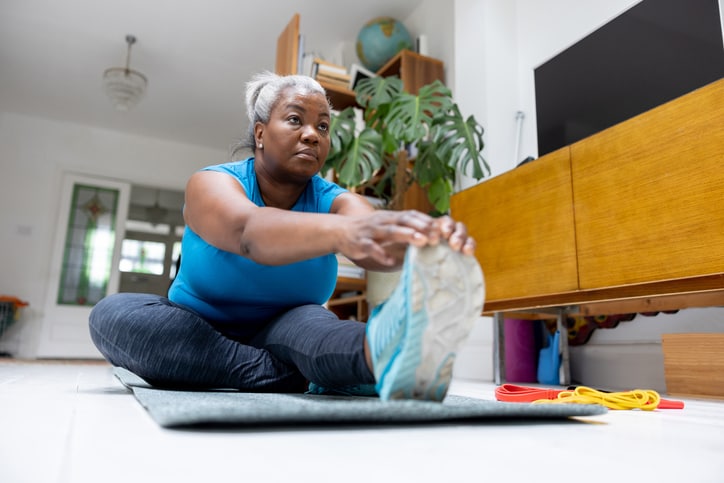When it comes to finding care for your aging loved ones, you want to make sure you find the right type of care, as well as the right person for the job. But given that there are a ton of options out there, from in-home CNA care to adult daycare centers, that can quickly become overwhelming. Learning the differences between types of caregivers and the services they provide can be time- and energy-consuming.
However, if your loved one doesn’t require any medical skills or attention, but you want to find someone to help with simple tasks or to keep them company, a non-medical caregiver can be just the solution you’re looking for. Here’s what you need to know about this type of care.
What does non-medical home care mean?
A simple definition for non-medical home care is just what it sounds like: care without any medical assistance. Wendy Adlerstein, LSW, executive director and owner of the home health care agency FirstLight Home Care in west suburban Boston, describes non-medical care as “custodial.” These caregivers “deliver a range of assistance to someone when it comes to daily tasks and safety supervision,” she says.
Non-medical care also offers the chance for your aging loved one to find a caregiver with whom they can socialize, manage daily tasks and needs, as well as alleviate many of the less visible components of aging like loneliness and memory loss.
Types of non-medical care
There are two general types of non-medical care: companion care and personal care. Although they’re very similar, there are a few differences in the type of care your loved one may receive.
Companion care
Companion care, according to Jennifer Tucker, COO of Homewatch CareGivers based in Englewood, Colorado, “provides emotional and social support and can include help with daily activities or light housekeeping.”
Those tasks may include things like:
-
Companionship.
-
Socialization.
-
Errands like cooking, cleaning and laundry.
-
Transportation to and from appointments or activities.
Personal care
Tucker adds that personal care is a bit more hands-on and can also include activities of daily living, like:
-
Bathing.
-
Dressing.
-
Feeding.
-
Medication reminders.
-
Assistance moving around and getting to the bathroom.
Even if you feel your loved one still leads an independent lifestyle and isn’t quite ready for this level of in-home, non-medical care, there is one important aspect that cannot be overlooked: loneliness.
“Loneliness is an epidemic, and a caregiver can become a trusted friend who not only helps with safety in the home but also alleviates the sense of isolation,” says Tucker.
While companion care is a helpful way to reduce feelings of loneliness, even personal care providers can benefit seniors emotionally and socially.
What’s the difference between non-medical and medical care?
According to Sarah Feldscher, founder of Total Senior Services in St. Louis, the biggest difference between medical and non-medical care is “the level of care provided.”
If your loved one has a specific health condition that requires anything beyond basic custodial care, finding medical care is probably the better option. You can find licensed professionals and medical caregivers who can do things like administer drugs, change catheters or provide other forms of care that require medical training.
”Non-medical [caregivers] will not be licensed to help with those items,” Feldscher says.
Adlerstein also adds that medical home care is best for those “rehabilitating from an illness or surgery, or if they require more clinical monitoring by medical professionals.”
How do I know if non-medical care is right for my aging loved one?
Beyond companionship and help with daily tasks, non-medical care is a good option for those who may not feel comfortable leaving their loved home alone for a number of reasons. According to Adlerstein, children and family members may notice their elderly loved one:
-
Forgetting more things (to lock the door, turn off the oven, etc.).
-
Becoming disoriented.
-
Having trouble walking or getting out of bed.
-
Becoming less coordinated when walking or doing basic activities.
-
Having difficulty driving (small accidents, unsafe practices, etc.).
There are other warning signs that may signal a loved one needs additional care. These include “unpaid bills, a change in appearance such as unwashed clothes or not showering, expired food in the kitchen, and other signs that a person can no longer fully take care of themselves,” according to Tucker.
Feldscher also wants families to know that choosing non-medical care — or any type of care for that matter — doesn’t just include helping your loved one.
“It is not always about knowing when the senior needs assistance, but when you as a family member also need extra assistance,” she says.
The right time to find care, says Feldscher, is “whenever you or your loved one are struggling to stay on top of everyday items.”
When we see our aging loved ones struggling to do everyday tasks, we as family members step in to help. This can become overwhelming, however. By hiring help for time-consuming tasks, you can get back to spending quality, enjoyable time with your loved one, notes Feldscher.
How do I find non-medical home care?
Here are a few ways to get started finding the right non-medical caregiver:
-
Search for local, individual caregivers online. Make sure to background check final candidates.
-
Find a caregiver through a local home care agency. You can tell them more about your specific needs, and they’ll work to find the best fit.
-
Ask people you trust for recommendations. If you already know people who are receiving non-medical care, they can act as a resource — either providing individual recommendations or an agency they’ve worked with.
If you’re still not sure which avenue to take to find non-medical care, you can also weigh the pros and cons of working with an agency or finding an individual caregiver.
How much does non-medical home care cost?
The cost of non-medical care can vary greatly depending on where you live. According to the 2019 Genworth Cost of Care Survey, the average hourly rate nationwide is $22.50 per hour, with some states as low as $17 per hour and others as high as nearly $30 per hour.
Choosing to hire independently is a little less costly. According to Care.com data, the hourly price for in-home senior care in 2018 was $17.32. However, there is a lot more work on your end, as it’s up to you to research, compare and vet potential caregivers. It’s also important to note that you would be responsible for filing household employee taxes.
If you hire through an agency, you may encounter higher expenses for overhead costs. However, an agency is likely to provide things, like backup care if your primary caregiver is away or sick and offer care on holidays and weekends.
Does Medicaid cover non-medical home care?
According to the American Council on Aging, Medicaid pays for some in-home, non-medical care services in all 50 states. Benefits vary state-to-state and certain eligibility requirements must also be met. Additionally, the amount Medicaid pays towards non-medical services varies by state, as well.
You can check your state-specific Medicaid eligibility requirements to get a clearer picture of what type of coverage you may receive.
The bottom-line on your non-medical home care hunt
No matter which route you take to find your loved one the best non-medical care, you’ll do well to trust your intuition on the timing and process of your search.
As Alderstein notes, “If a family member is worried about the well-being and safety of their loved one living at home, it’s a good time to begin to research home care.”



